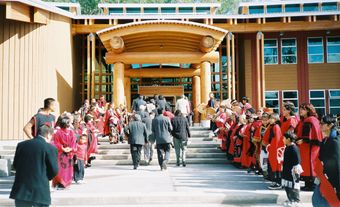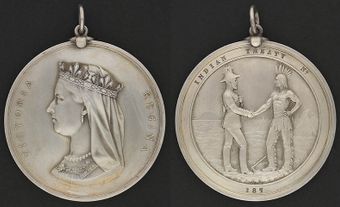Land claims seek to address wrongs made against Indigenous peoples, their rights and lands, by the federal and provincial or territorial governments. There are different types of land claims. Comprehensive claims (also known as modern treaties) deal with Indigenous rights, while specific claims concern the government’s outstanding obligations under historic treaties or the Indian Act. There are many ongoing comprehensive and specific claims negotiations in Canada.
What is a Land Claim?
Land claims seek to address wrongs made against Indigenous peoples, their rights and lands, by the federal and provincial or territorial governments. There are different types of land claims. Comprehensive claims (also known as modern treaties) deal with Indigenous rights, while specific claims concern the government’s outstanding obligations under historic treaties or the Indian Act. There are many ongoing comprehensive and specific claims negotiations in Canada.
Comprehensive Claims
Comprehensive claims deal with Indigenous rights. These claims are based on the traditional use and occupancy of land by First Nations, Métis and Inuit who did not sign treaties. From 1871 to 1921, Canada entered into a number of treaties with Indigenous peoples. These historic treaties cover much of Ontario and the Prairie Provinces (Alberta, Saskatchewan and Manitoba), and parts of British Columbia, Yukon and Northwest Territories.
Non-Indigenous settlement and development of most of the Yukon, the Northwest Territories, British Columbia, Quebec, eastern Canada (New Brunswick, Newfoundland and Labrador and Prince Edward Island) and the northern parts of some provinces proceeded without addressing or extinguishing Aboriginal title to lands. Comprehensive claims settlements from these areas of Canada usually take the form of modern-day treaties and include a variety of terms such as money, land, forms of self-government, rights to wildlife, and provisions for the joint management of lands and resources. (See also Comprehensive Claims: Modern Treaties.)
Specific Claims
Specific claims originate in First Nations’ claims that the Government of Canada did not fulfill its obligations either under historic treaties or the Indian Act. Types of claims include the inadequate allocation of reserve land, the failure to protect reserve land from unlawful disposition or lease, fraud on the part of government employees, and the misadministration of First Nations’ funds and other assets.
Specific claims are settled by negotiation or by court action, and settlements can consist of monetary compensation or land. The Specific Claims Tribunal was formed in 2009 to speed up the final settlement of these grievances, many of which were first pressed by First Nations decades ago. (See also Indigenous Peoples and Specific Claims.)

 Share on Facebook
Share on Facebook Share on X
Share on X Share by Email
Share by Email Share on Google Classroom
Share on Google Classroom




